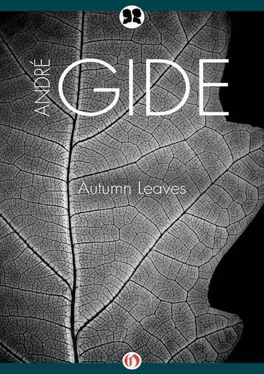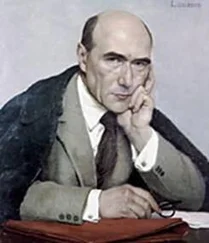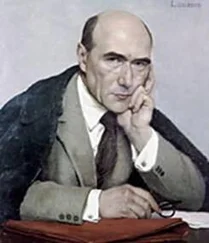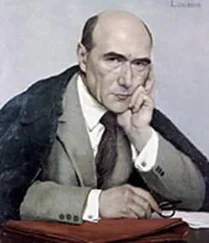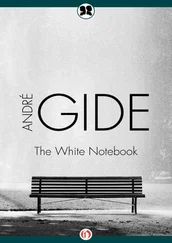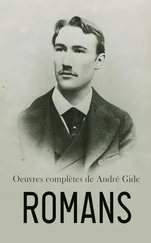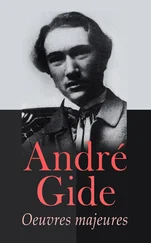I am grateful to him for having been the first to notice my first book: Les Cahiers d’ André Walter. This book, never having left the bookstore, was still piled up at Perrin’s, Barrès’ editor, where Barrès noticed it, and glanced at it.… The little of it that he read gave him the desire to know me. He communicated with me. At that time, I was hardly more than twenty years of age. Barrès was my elder by eight years. He already enjoyed considerable prestige among the young although he had not yet published more than a few volumes — those that form the consecrated series which he called Le Culte du Moi. 1 Besides he had directed all by himself a little magazine: Taches d’encre, of which he was the sole editor — that had only three numbers, but in which could be read a study of Baudelaire, which was not, which is not yet, well known, and that I consider one of the most remarkable, truly masterly! Masterly, Barrès was everywhere and ceaselessly, in his gestures, in his bearing, in the tone, haughty, ironical and scornful, of his voice. He imposed himself, as I suppose Chateaubriand must have done, whom to be sure he resembled closely. But larger of stature, better built, and breathing from his whole being a sort of authority somewhat scornful or condescending by which, nevertheless, one liked to be taken in. He charmed, but one approached him only in trembling. Very careful of his person, and always admirably dressed, with great elegance and a sort of genteel disorderliness at the same time. I recall his tall stature, his look a little equine (but that of a timid horse, if not a frightened one), — let us remember that Homer spoke of the bovine expression of Juno, — a very prominent, aquiline nose, very black locks of hair that he brought forward or allowed to fall over his fine forehead.… He might have been Spanish. Who was it said: We all resemble our bust (it was Richepin, I think)? Barrès, in love with Toledo, resembled a portrait of El Greco.
When a note from him invited me to pass a few minutes with him, my heart beat very hard. Harder yet, when I knocked on his door. He was then occupying what he calls “a certain little house in the Monceau section,” one of the most elegant quarters in Paris. I have no exact remembrance of the conversation I had with him on that day. I was not precisely at my ease and Barrès helped little in bringing out and showing up personalities different from his own. I only remember this accurately: having to wait in a sort of lobby until the master was ready to receive me, I was admiring rows of very prettily bound books on the shelves of a kind of bookcase in that little room. Now Barrès had the reputation of reading little and boasted of it.
I had before me the complete works of Byron, and I committed the indiscretion of taking down one of the volumes. The whole series tumbled in one fell swoop. The books were dummies; it was a hidden compartment, the specious covering of a drawer, which contained (I closed it quickly) brushes and bottles of scent.
At that time Barrès exercised over a number of young people an extraordinary prestige. The admiration that some of them offered him was a sort of devotion, worship. My friend, Maurice Quillot, to whom I later dictated my Nourritures terrestres, had a sort of niche constructed in his humble student’s room where, instead of an icon, a large photograph of Barrès’ portrait by Jacques-Emile Blanche received the homage of little lighted candles.
And I remember that same Maurice Quillot (ah! how young we were then!) invited me to share the expenses of a mass that we had said, at Saint-Séverin, for the repose of Barrès’ soul — he had just married, not died.
Yes, Barrès read little. Scarcely more than Pierre Loti. If he was, nevertheless, very well informed, it was because his secretaries and friends read for him, furnished him arguments and adequate quotations.
Anything that could advance him more in his own direction, anchor his opinions, was what that great egotist looked for in books, in landscapes, in the spectacle of life. Unbelievably lacking in curiosity about others, I don’t know whether he discovered or even simply recognized the value of any one of his contemporaries who was later to equal him in reputation, or lent the slightest attention to Jules Renard, to Proust, any more than to Claudel, Valéry or Giraudoux.
My relations with Barrès did not last long. After the publication of the D é racin é s (in 1897), I began to understand, to feel, or to foresee how harmful and even evil the theories he was emphasizing and that lured him along could be for healthy humanism and for us French. I am going to try to be specific about that.
Those theories, French or too exclusively French, those local truths specifically Lorrainese, Barrès opposed to Kant’s doctrine, to what he called: “unhealthy Kantism.” Why unhealthy? Because Kant founded his morality on general principles; because he had said: “Always act in such a way that you are willing for the maxim of your actions to be set up as a universal law.” Now, according to Barrès, there could not be, in morality, any universal, any absolute; but only particular, opportune truths depending on happenings and places. The true, the good, were relative things, and each one of us should understand it, on listening to the lesson, the statement in the land and the dead.
Under a new aspect, it was the renewal of the old quarrel against the Jansenists. It was the “politics first” of Maurras and the Action française. It was already in germ, in force, the apology for the “false patriotism” of Colonel Henry, at the time of the Dreyfus affair, that is to say, without regard for the truth, the production of an apocryphal document, considered as opportune and serviceable, according to the famous saying: “The end justifies the means.” Oh! that doctrine may well appear marvelous and of great assistance as long as you are the only one to make use of it. It is very nice, very practical, to teach the young Philippe Barrès, in Les Amitiés françaises, that the Germans have no souls, and that, therefore, with them, one can “go the limit.” But who will prevent the Germans from soon reasoning in the same way, and this time at our expense? And you will see the fine theories of Barrès, when adopted by a neighboring enemy people, boomerang against us to slaughter us with their backfire. I recognize Barrès’ lesson in Hitler.
But holding tight to his theories will be all important to Barrès, even more than the feeling of defeat and bankruptcy to which his theories lead us. We shall read in Les Amitiés (and I do not refrain from quoting to you a passage as significant, as deplorable, in which it is all mixed up together: the theory, the resolution, and some facile and false poetry or other …:
“No disaster (it was a question of the one of 1870), no disaster could deprive our sons of the enjoyment of knowing their submission to implacable laws, to necessity. Our sons will be well paid if they sometimes feel how it intoxicates the heart to overflowing, at the beginning of a glorious day, or under a steady rain, to carry a flower to a tomb, and to put into that act, whole armfuls, all our gardens, all our harvest of dreams.” (p. 40).
Tombs, tombs, everywhere and always. To carry armloads of flowers to the tombs … in truth, that’s what it is all about!
From the beginning, from the publication of the Déracinés , I rose up against Barres, or at least against his doctrines.… From then on, I never ceased to revolt against him; to the degree that Massis, in his Jugements, could argue that my struggle against Barres was my only reason for writing and that, without Barres, I should not exist (a literary sense is understood). That, in spite of Massis, I was right to rise against Barres, events, alas! have proved only too well. How blind were certain ones not to have understood at once, to have been so long in understanding where that would lead, sooner or later, necessarily. Moreover the Action française has survived, and I think that the French youth of to-day no longer read Barres (they are wrong), in any case they no longer follow him (they do well). A curious and significant thing: to-day it is in the camp of the adversary, it is among the communists, that the ravages of the relativist doctrines are now making themselves felt, that of “the end justifies the means.” I think them marvelously well-fitted to pervert judgment, sometimes forever. They are the cause of the worst errors, in private life as in politics, and I do not think that one can, with impunity, ever compromise with the truth — let us say, if you prefer: God.
Читать дальше
